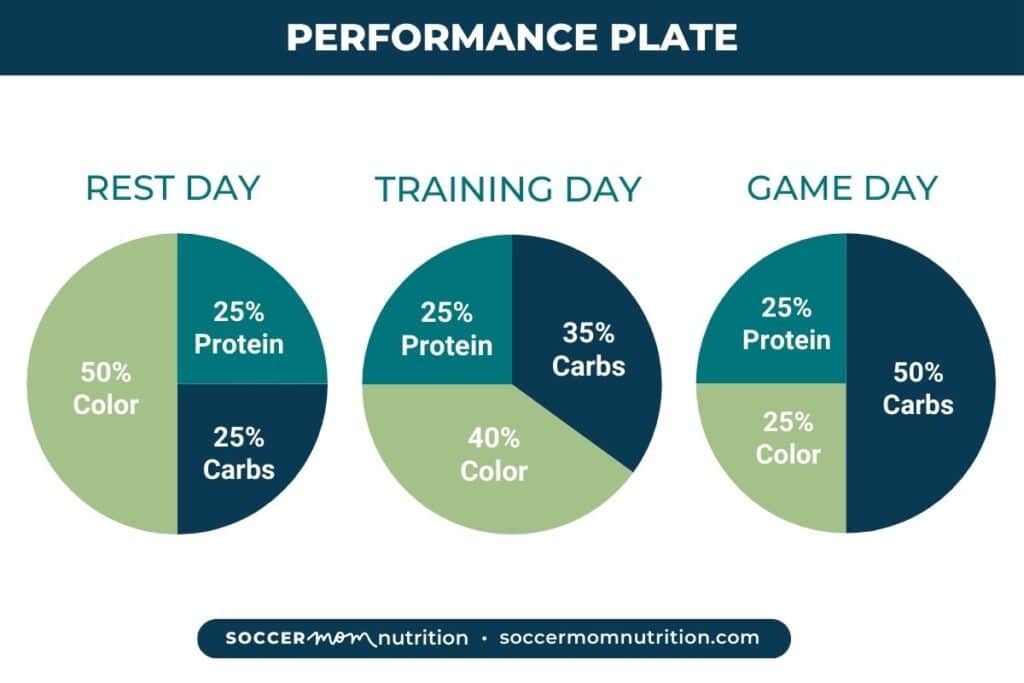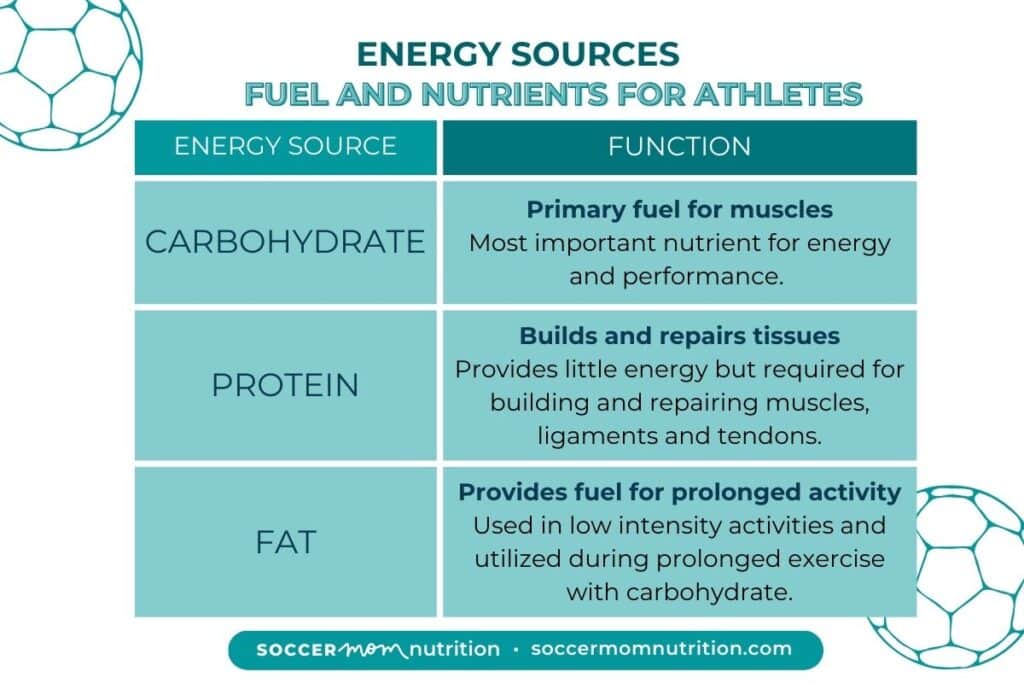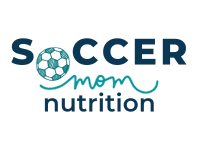7-Day Meal Plan to Fuel Teenage Athletes
Let’s face it, the life of a teen athlete is hectic.
Striking the right balance between busy schedules and sports nutrition is key for teenage athletes. Proper nutrition not only supports your health and growth but also directly impacts your energy levels and athletic performance.
To help you stay on track and optimize your performance, I’ve crafted a dietitian tailored 7-day meal plan to fuel teen athletes. It’s designed to inspire teens and their parents with a variety of meal and snack ideas.
From breakfast burritos to stir fry to pre practice snacks, this meal plan guide will help even the pickiest athletes.
Keep reading for the meal plan as well as my tips and tricks to make it easier to fuel even on the busiest days.

7 day meal plan for teenage athletes guide
Our sports dietitian-created 7-day meal plan for teenage athletes guides you with basic meal ideas for you to follow to help you meet your energy needs for activity and life.
I created these based on meals and snacks that my own teen athletes eat regularly and I find pretty easy to make.
When you follow this teen athlete meal plan, you’ll eat balanced meals that include protein, carbs color and healthy fats. The meal plan can easily be adapted to meet the needs of your performance plate meals too.
Also, you can mix and match meal ideas to meet your energy needs. You can also check out some of our other posts on dinner ideas, breakfast, lunch and healthy snacks for even more ideas.
| Day | Breakfast | Lunch | Dinner | Snacks |
| Day 1 | Scrambled eggs with spinach, whole-grain toast and mixed berries | Grilled chicken breast, quinoa salad with cucumber, bell peppers, and feta and, almonds | Baked salmon with lemon-dill sauce, steamed broccoli, brown rice | Trail mix with nuts, seeds, dried fruits, low fat Greek yogurt, hummus and veggies |
| Day 2 | Greek yogurt with honey, sliced bananas, whole-grain granola | Turkey and avocado whole-grain wrap, carrot sticks with hummus. Serve with a side of sliced apple | Beef stir-fry with mixed vegetables, brown rice | Greek yogurt with berries, carrots with hummus, cottage cheese and peaches |
| Day 3 | Peanut butter and banana smoothie with oats, whole-grain toast | Lentil soup, whole-grain roll, sliced pineapple | Grilled shrimp skewers, quinoa salad (cherry tomatoes, black beans and corn) | Apple slices with almond butter, whole grain crackers and cheese sticks, hardboiled egg and grapes |
| Day 4 | Breakfast burrito with scrambled eggs, black beans, salsa, avocado and cheese and side of mixed berries | Grilled chicken skewers, wild rice, sliced bell peppers with hummus | Shrimp and orzo salad with tomato, feta cheese, arugula. | Fig bar and string cheese, trail mix, banana with nut butter |
| Day 5 | Whole-grain pancakes with fresh berries, and low-fat milk | Marinated tempeh with mixed greens, pepitas, feta, chickpeas, vinaigrette dressing, whole-grain pita wedges | Grilled chicken thighs with barbecue glaze, sweet potato wedges, sautéed green beans | Pretzels with hummus, hardboiled egg and sliced apples, applesauce and string cheese |
| Day 6 | Oatmeal with sliced bananas, chopped nuts, high protein milk, and orange juice | Veggie wrap with tofu, hummus, avocado, bell peppers, cucumbers and spinach in a whole-grain tortilla, sliced mango | Baked cod with citrus-herb marinade, quinoa pilaf with mixed leafy green salad | Roasted chickpeas, cottage cheese and pineapple, string cheese and whole grain crackers |
| Day 7 | Scrambled tofu with diced tomatoes, spinach, whole-grain toast | Chickpea and vegetable curry, brown rice, pineapple chunks | Beef and broccoli stir-fry, steamed jasmine rice | Trail mix (nuts, seeds, dried fruits), banana with nut butter |

Performance plates for teen athlete meals
Meal planning is easier when you use the balanced performance plate concept. Teens can adjust their meals and portions to meet their activity and energy demands for the day.

Basic building block nutrients for teen athletes
- Carbohydrates: These are the body’s primary energy source. Opt for whole grains and high fiber like brown rice, oats, quinoa or whole wheat pasta.
- Proteins: Vital for muscle repair and growth, lean sources like chicken, turkey, fish and plant-based options like tofu or legumes are excellent choices.
- Healthy fats: These provide long-lasting energy. Avocado, nuts, seeds and olive oil are great sources.
- Vegetables: Packed with essential vitamins and minerals, colorful veggies like broccoli, carrots and spinach should make up a significant portion of the plate.
- Fruits: Natural sugars and antioxidants come from fruits like berries, apples and oranges.

Importance of breakfast for teens: fueling your day
One of the most common mistakes that teenage athletes make is skipping breakfast. You may think that you are saving time or calories by doing so, but you are actually setting yourself up to fail.
Breakfast is the first step in providing your body with the energy it needs to power through the day. A nutritious breakfast kickstarts your daily fueling and helps you stay focused in school and during training.

Spread energy intake throughout the day
One reason I put this meal plan together is I see too many teens skipping meals and snacks throughout the day. I recommend teenage athletes spread energy intake throughout the day.
This means having balanced meals and snacks to prevent energy crashes and ensure optimal performance. One substantial meal can’t make up for missed nutrition, especially if you’ve got a game or intense practice later in the day.
So, you should start your day with breakfast and then have meals and snacks planned throughout the day to meet your energy needs.
Prepping foods for teen athletes
Prepping foods in advance can help save time, money and hassle and ensure that you always have something nutritious to eat. Make sure you include some grab and go foods so that breakfast is easy and impossible to skip!
Also, have plenty of snacks packed in your gear bag, locker or car, and some of your favorites waiting for you in the fridge when you get home from school or practice.
Plan your meals and snacks
Using our meal plan for teenage athletes guide, plan your meals and snacks for the week. Consider your training schedule, preferences and goals when making your plan.
Also, our grocery list for athletes is a guide to stock up on the foods you need from each food group: carbs, protein, fat, fruits and vegetables.
Prep your foods for meal planning
Choose one or two days a week to do your food prep. This could be on the weekend or on a rest day. Set aside a few hours to cook, chop, portion and store your foods for the week.
When you prep foods ahead of time, make sure to have different sizes of containers and bags to make storing and freezing easy.
1. Cook your proteins, grains and starches in bulk
Bake, grill, roast or slow-cook your chicken, turkey, beef, fish or tofu and then divide them into individual portions to store. You can also hard-boil eggs or make egg muffins for easy breakfasts or snacks.
Cook oatmeal, rice, quinoa, pasta, potatoes or sweet potatoes and then store them in the fridge or freezer.
2. Wash and chop your fruits and vegetables
You can wash and chop your fruits and vegetables and store them in ziplock bags or containers in the fridge. You can also make salads or stir-fries and keep them in the fridge for a few days.
Additionally, freeze some fruits and vegetables for smoothies or soups.
3. Make your own sauces, dressings and dips
You can also make your own sauces, dressings and dips using ingredients like yogurt, hummus, salsa, pesto, peanut butter, honey, mustard, vinegar, lemon juice, herbs and spices.
Store these sauces in small jars or containers in the fridge and use them to add flavor to your meals and snacks.
4. Portion your snacks
Make your snacking easy by portioning your snacks into small bags or containers and keep them handy in your pantry, fridge or backpack.
Snack examples include nuts, seeds, dried fruits, granola bars, cheese sticks, yogurt cups, crackers, popcorn or trail mix.

A day in the life of fueling for a teen athlete
Below is an example of what a teen’s day might look like. If you have practice right after school, follow this guide below making adjustments for your school schedule times.
But if you have a late evening practice, you’ll want to eat a smaller dinner or mini meal prior to practice and then a hearty recovery snack before bed.
7:00 am (Wake-up)
- Drink at least 8 oz of water first thing, then continue drinking water throughout the day
7:30 am (Breakfast)
- Low-fat Greek yogurt topped with a mix of fresh blueberries, raspberries, a drizzle of honey and high fiber granola. Side of whole grain toast with peanut butter.
- Overnight oats topped with chia seeds, chopped apples, cinnamon
- Toaster waffles, nut butter and banana
- High fiber smoothie with high protein milk, fruit, chia seeds
10:30 am (Mid-morning snack to eat between classes)
- String cheese, orange or whole grain crackers
- Apple slices and nut butter
- Hummus and carrots
12:30 pm (Lunch)
- Burrito bowl with chicken and rice
- Turkey sandwich with cheddar, guacamole, tomato on whole grain bread
- Quinoa salad with roasted veggies, feta and vinaigrette
- Tofu and veggie wrap with hummus and avocado
3:45 pm (Pre-practice snack)
- Get energized for practice with a pre-workout snack:
- Peanut butter and jelly sandwich
- Applesauce and trail mix
- Hummus and whole grain crackers
- String cheese and crackers
5:00 pm (Practice/Training/Game)
7:00 pm (Dinner)
- Grilled salmon, roasted sweet potatoes, side of roasted cauliflower
- Chicken skewers, brown rice, roasted broccoli
- Pesto pasta with shrimp, peas and feta
- Buddha bowl with tofu, veggies and brown rice
9:30 pm (Late evening snack)
- Cottage cheese and peaches
- Low fat greek yogurt with berries
- Frozen yogurt with fresh fruit
- Bowl of cereal and high protein milk

Why you don’t need additional supplements
I know you may be tempted to take additional supplements to enhance your performance, health or appearance.
But, usually you can get all the nutrients you need from food.
A balanced diet that includes a variety of whole foods can provide you with enough carbohydrates, protein, fat, vitamins and minerals to support your growth, development and performance.
If you have questions about supplements, I recommend you reach out to a sports dietitian or your healthcare provider.
Final thoughts
Our 7-day meal plan recognizes the challenges of being a busy teenage athlete. It emphasizes the importance of never skipping breakfast and spreading energy intake throughout the day.
By following this plan, you can maintain energy levels, support growth, and help teens perform their best while navigating demanding schedules.
Don’t forget to adjust portion sizes based on individual needs, and stay hydrated to stay at the top of your game!
Join our mailing list and get our FREE Pre-Activity Fueling Guide.
Stephanie Magill, MS, RD, CD, FAND has over 22 years of experience in public health and nutrition. As a performance registered dietitian nutritionist, Stephanie specializes in sports nutrition and provides simple and actionable information so that athletes can be well fueled for high performance on and off the field. Stephanie has a Master’s Degree in Nutrition and is a Fellow of the Academy of Nutrition and Dietetics.

